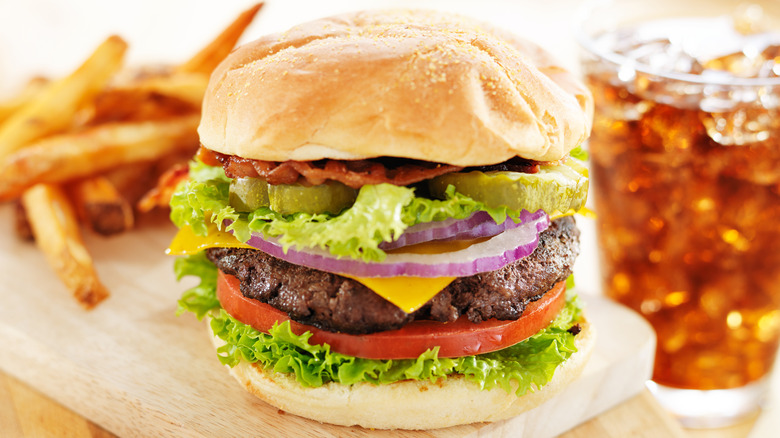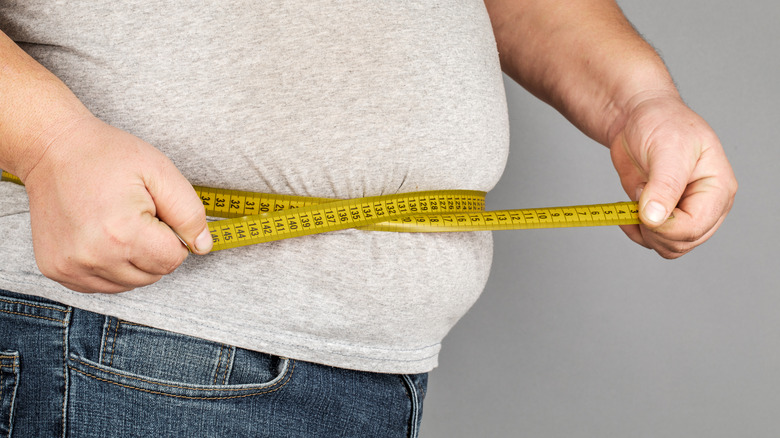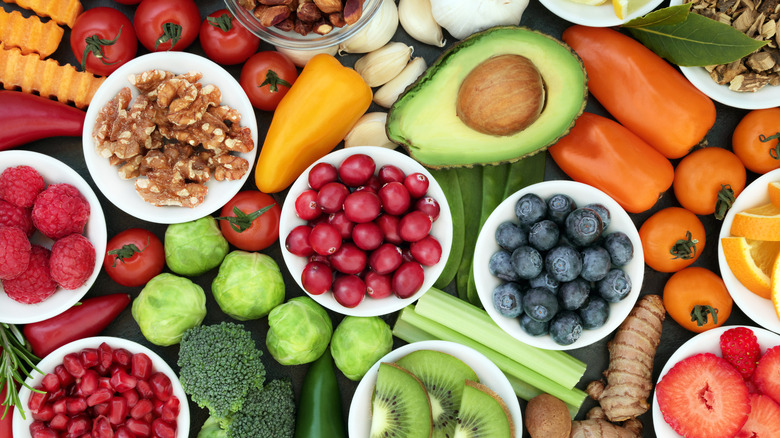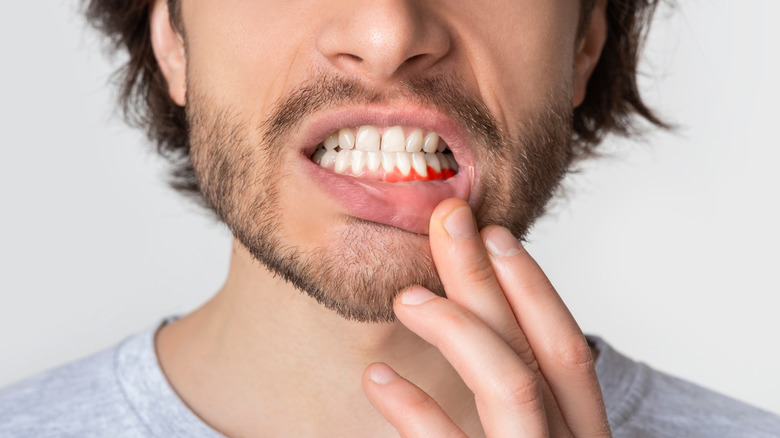When You Eat Fast Food Every Day, This Is What Happens To You
Fast food is deeply ingrained in American culture. Today, you might not have a supermarket nearby, but there's sure to be a McDonald's, Burger King, or Subway within spitting distance. In the United States alone, fast food generated $239 billion in revenue in 2020, and it's growing every year (via Statista). Why? "It's easy, it's filling, and it's convenient and inexpensive," declared Eric Schlosser, author of "Fast Food Nation," a critically acclaimed book, that exposed the dark side of the fast food industry (via CBS HealthWatch).
An occasional indulgence of fast food in an otherwise healthy diet is not such a big deal, Dr. David Katz, director and co-founder of the Yale Prevention Research Center, told ABC News. But what if you hit the Dunkin' Donuts or Wendy's drive-thru every single day? Can a regular menu of a burger, fries, and soda, or a similar quickie meal, really do the body harm? As it turns out, the answer is a resounding yes. So what are the risks? We're glad you asked!
You'll have digestive problems
You are what you eat, right? The bad news is the most common fast foods are not kind to your digestive tract. If you've ever experienced, shall we say, an explosive output after downing a bag of Mc-somethings, then you know what we're talking about! These types of highly processed meals that you get at your local fast food franchise are full of inflammatory foods, according to the Cleveland Clinic. Think sugary drinks, bacon, sausage, and pepperoni, mayonnaise and oil (for fried foods), and white bread and french fries. Hmm, sound familiar? It's basically a party in your mouth of sugar, salt, saturated fats, chemical preservatives, fillers, and simple carbohydrates that break down into sugar, says The Daily Meal. Eaten regularly, these types of foods cause chronic inflammation and a very unhappy gut.
"Ultimately, [fast food or junk foods] contain a variety of unnecessary added ingredients that can contribute to a lack of bacterial diversity, a compromised gut lining — also known as leaky gut — and chronic inflammation," Will Cole, a functional medicine practitioner and senior clinical director of the Cole Natural Health Centers in Monroeville, Pennsylvania told Livestrong. "This can contribute to symptoms such as diarrhea, constipation, bloating, and gas."
You'll pack on weight
Along with chronic inflammation, fast food is generally high in calories and lacking in nutritional value. If you eat off a typical fast food menu every day, as one in three Americans do, your risk for obesity will increase (via The Washington Post). Obesity is one of the leading causes of preventable death in the United States, ranking right up there with smoking and high blood pressure, reports The Harvard Gazette.
Teenagers are greatly affected, too. A 2018 study reveals that over the past three decades, the percentage of calories from fast food is five times greater among adolescents. Liz Weinandy, a registered dietitian at The Ohio State University Wexner Medical Center, told CNN, "It is funny, when we see news clips of a shark swimming near a beach, it scares us into not going near that beach. However, what we should be scared of is double cheeseburgers, french fries and large amounts of sugary beverages,"
Your blood pressure may suffer
Too much salt can make blood pressure soar, but salt and fat are what make fast food taste good! You might be thinking "What if I just don't add any salt to my fries?" Then you'd be in the clear, right? Actually, the answer would be no because salt is already in the food before you're even handed the paper bag, pizza box, or dine-in tray. "A lot of the sodium in fast foods is hidden," explained Jennifer Cholewka, a registered dietitian and advanced clinical nutrition coordinator at Mount Sinai Hospital in New York City. "It doesn't come from the saltshaker," she told Livestrong.
The trouble is that most of us eat way too much sodium. The American Heart Association recommends no more than 2,300 milligrams of sodium per day, — with an ideal amount of less than 1,500 milligrams per day. Nevertheless, most Americans can reach that top number quicker than you can blink, eating upwards of 3,400 milligrams daily, per the FDA. At 1,970 milligrams, just one Wendy's Baconator, medium fries, and medium root beer will come close to maxing out your entire daily sodium intake, according to Fast Food Nutrition.
You'll be starved of nutrients
Fast food is like a pill for hunger. It's fast and filling, and it does the job of staving off hunger pangs. It's providing calories to keep your body going, but eating too much fast food also leaves you starved of necessary micronutrients, according to a study in the Journal of the American College of Nutrition. "Your body is temporarily full with empty foods that don't provide nourishment, so even though you may have eaten a lot of calories, you won't be satisfied for long," New York-based nutritionist Amy Shapiro told Vice.
What types of nutritional deficiencies are we talking about? The biggies are fiber, vitamins and minerals, and healthy fats like olive oil, nuts, and avocados. You can discover some slightly better items here and there, but you won't find all of these components on the typical fast food menu, according to Livestrong.
Sharon Palmer, a Los Angeles–based registered dietitian nutritionist told Everyday Health, "What's lacking in fast food are the vegetables — you can find protein and bread, but in a sandwich it's usually just one tomato and one leaf of lettuce, and that's not enough nutrients."
Your energy levels may plunge
You know when you gobble down a big ol' burrito and Coke at lunch and then slide into a food coma for the rest of the day? That's the spike-and crash pattern typical of a fast food meal that can leave you feeling, well, kind of blah! "You're going to have that after-lunch slump where you feel like you don't want to do a whole lot, or you don't have the energy to play with your kids," Lindsay Malone, a registered dietitian, told the Cleveland Clinic. "So, you want to think about food as fuel for your body."
It's the refined carbohydrates and added sugars that create a vicious yo-yo cycle that spikes your blood sugar and then unleashes insulin to calm things back down (via Cleveland Clinic). Ever notice that when you chow down on a heavy meal of fried chicken that you feel pretty listless soon afterward? It's all the fat from the breading and deep fryer, making it hard on your digestion. Fatigue can also come on simply because of the saltiness of fast food entrees. Eat a lot of it and it leads to dehydration and a lack of energy (via Bustle).
"A food hangover is your body giving you feedback. Your gut is basically communicating to your brain, sending it a warning signal about what you just ate," Dr. Robynne Chutkan, an integrative gastroenterologist in Washington, D.C., told Shape. That response is actually important. "If that didn't happen, we'd all be devouring Doritos and hamburgers every day. And that's bad news, not just for your weight, but for the health of your entire body," the expert continued.
You may feel depressed
Does eating fast food actually make you depressed? According to a study in the Public Health Nutrition journal, it sure does. In fact, the study shows you are 51% more likely to develop depression if you eat fast food. Results of the study also showed that the more fast food you eat, even in smaller amounts, the higher likelihood of depression. One reason for this may be fast food's lack of essential nutrients, specifically B vitamins, omega-3 fatty acids (like fish and nuts), and olive oil.
It should come as no surprise that the famed Mediterranean diet, which emphasizes fresh fruits, vegetables, nuts, olive oil, and fish, has been shown in studies to lower rates of depression by as much as 33%, according to Medical News Today.
"Higher intake of fast food may very well increase risks of depression by causing poor health in general," Dr. David Katz, director of Yale University's Prevention Research Center in New Haven, Connecticut, told ABC News. "But depression may also increase fast food intake. We use the words 'comfort food' for a reason."
Your cancer risk increases
You may have thought that the food you eat is the only thing to be concerned about but, in reality, the packaging and how it's handled are also potential issues. Research shows that food prepared in restaurants can have a high level of phthalates, which are hormone-disrupting chemicals added to plastics to make them soft and flexible. Phthalates are linked to a variety of reproductive health issues, breast cancer, and other health issues, and they can get into our food (and other non-food items) during processing and packaging, according to WebMD.
A National Health and Nutrition Examination Survey found that those who dined out in restaurants, and, in particular, if they ate hamburgers or sandwiches with meat, showed phthalates levels that were 35% higher than those who ate most meals at home (via ScienceDirect). For teenagers, the results were even more stunning, showing levels 55% higher (via Environmental Health News). Among the many ways exposure to phthalates occur include packaged foods at your local supermarket to microwaving your own food in plastic containers.
"The best way to reduce exposure is to eat whole, fresh foods at home as often as possible," said Sarah Evans, an instructor in environmental medicine and public health at Mount Sinai's Icahn School of Medicine in New York City. "Phthalates have been shown to accumulate in high-fat foods, so limiting consumption of those items may be effective at reducing exposure" she told WebMD.
Your skin could break out
If you've ever had acne, the occasional pimple, or skin that's like an oil slick after an hour or two, then you've probably heard all your life that greasy and sugary foods are to be avoided at all costs. While genetics and hormones obviously play a huge role, according to Healthline, blood sugar spikes from eating lots of refined carbs are a prime cause of acne breakouts, clinical dermatology professor Dr. Rajani Katta of the McGovern Medical School at University of Texas Health Science Center at Houston explained on her website.
Fast food, sugar, and fat topped the list of risks for acne in adolescents in a study published in the Journal of The European Academy of Dermatology and Venereology. A 2020 study in the Journal of the American Medical Association supported that adults were affected by those same triggers.
Dr. Valori Treloar, a dermatologist in Newton, Massachusetts, told WebMD, "Your body responds [to spikes in blood sugar] by cranking out more insulin, which increases the production of skin oils and contributes to the clogging of follicles. It can wreak havoc on your skin." Blocked pores from airborne oils (such as from cooking), and possibly dairy products contribute to breakouts as well. Treloar added, "More research is needed [about the effect of milk], but it may be that the growth factors and hormones naturally found in milk somehow act as acne triggers."
You'll be more susceptible to allergies
You might not associate hay fever, severe asthma, or itchy skin rashes like eczema with a regular diet of fast food. But according to multiple studies, you have a significantly greater chance of developing these conditions if you routinely hit the drive-thru for a Whopper, Big Mac, or another quick-service burger.
Another study came to a similar conclusion about the significant link between children and teens consuming fast foods and suffering from severe asthma and eczema. "Eating fast food is not healthy for a multitude of reasons," Samantha Heller, registered dietitian and senior clinical nutritionist at NYU Langone Health in New York, told MedicineNet. "I cannot imagine any parent would choose the convenience of fast food over their child's health if they fully understood how deleterious a diet of fast and junk food is to children."
Though it wasn't clear specifically what elements in the food caused the allergic reactions, the researchers suspect it's the lack of essential nutrients and the high-fat content in the food that's resulting in chronic inflammation in the body, according to the non-profit European Centre for Allergy Research Foundation.
Your risk for type 2 diabetes skyrockets
It can be so satisfying to head to a local Starbucks and order a large sugary coffee like a pumpkin spice latte. The warm seasonal drink hits the right spot on a chilly morning. Seems pretty harmless, right? Well, it depends. It may surprise you that a grande-sized (16-ounce) pumpkin spice latte is packed with 48 grams of sugar, according to stats at Fast Food Nutrition. That converts to about 11 teaspoons in one drink! For perspective, the American Heart Association recommends a maximum of 6 teaspoons of added sugar for women, and 9 for men, for an entire day!
Repeat this habit day after day, combine it with little to no exercise, and you could be setting yourself up for a perfect storm of major weight gain and, ultimately, type 2 diabetes, according to Livestrong. "Carrying excess weight, especially around the abdomen, increases your risk of type 2 diabetes, as well as of other diseases like high blood pressure, heart disease, and even stroke," says Diana Licalzi, a Boston-based registered dietitian nutritionist, told Chicago Cares.
Saturated fats from a Burger King double Whopper with cheese, a bucket of KFC fried chicken, or sugar-loaded fountain drinks can all contribute to obesity and insulin resistance. Diabetes and other chronic conditions can ultimately be the result of the accumulation of those overindulgences.
Your brain function can dip
You probably aren't thinking about dementia when you hit the drive-thru but it may just be a real risk. "People are eating away at their brain with a really bad fast food diet and little-to-no exercise," Professor Nicolas Cherbuin, the head of the Australian National University's Center for Research on Aging, Health and Wellbeing, told The Guardian. "Many people who have dementia and other signs of cognitive dysfunction, including shrinking brains, have increased their risk throughout life by eating too much bad food and not exercising enough."
Studies have demonstrated that vascular and Alzheimer's dementia are more common in patients with type 2 diabetes. And since weight gain can lead to type 2 diabetes, it's a significant concern. Cherbuin, who led the Australian National University research, added, "As a society, we need to stop asking, 'do you want fries with that?' If we don't, then expect to see more overweight and obese people suffering from serious diseases."
Your heart attack and stroke risks rise
Most of us understand that fast food is not health food. But when you're hungry and looking for a place to eat, fast food chains are everywhere. Unfortunately, those quickie meals are also high in sodium and saturated fats, and with regular consumption, both of those things increase your chances of heart attack and stroke. "Today, eating processed foods and fast foods may kill more people prematurely than cigarette smoking," according to an article published in the American Journal of Lifestyle Medicine. "Most chronic diseases that afflict Americans are predominantly lifestyle induced, and the belief is that the vast majority of heart attacks and strokes could be prevented if people were willing to adopt healthy lifestyle behaviors," explained author Dr. Joel Fuhrman, a board-certified family physician and New York Times best-selling author.
If where you live is jam-packed with fast food chains rather than grocery stores and healthy dining options, research in one study provides eye-opening data that your community may play a key role in your cardiovascular health (via WebMD). The researchers tracked stroke data in Nueces County, Texas, and found that neighborhoods crowded with fast food restaurants showed a 13% elevated risk of ischemic strokes compared with those with few fast food restaurants, even after adjusting for demographics and neighborhood socioeconomic status.
"What we don't know is whether fast food actually increased the risk because of its contents or whether fast food restaurants are a marker of unhealthy neighborhoods," remarked Dr. Lewis B. Morgenstern, director of the University of Michigan's stroke program and lead author of the study, to WebMD.
You risk tooth decay
A fast food meal typically contains a triple whammy of salt, sugar, and carbonation. High amounts of sugar cause damage to your teeth. Plus, high amounts of sodium lead to receding gums, excessive sugars in soft drinks cause tooth decay, and carbonated sodas form acid that attacks and breaks down tooth enamel (per Healthline). Eventually, all those innocent-seeming sips of soda will probably result in a few cavities and an exciting trip to the dentist. Oh boy!
It's incredibly easy to exceed the dietary guidelines for added sugar from the American Heart Association, which calls for just 6 teaspoons of added sugar in a day for women and 9 for men. Yet get this: One medium Coke from McDonald's rolls in at an astounding 59 grams of sugar, or about 14 teaspoons, in just one drink. If you think that choosing lemonade will be a healthier choice, think again. A Chick-fil-A medium lemonade is loaded with 55 grams (13 teaspoons) of sugar and citric acid (per Fast Food Nutrition), which is even worse on tooth enamel than the phosphoric acid in soda, a study reported.
"It is not just fast-food beverages that contain staggering levels of sugar. Dipping sauces, salad dressings, and even burgers and sandwiches are often filled with sugar as well," according to Ranches Family Dental in Utah. "If you regularly consume fast food, you could be putting your teeth at risk for developing cavities and decay."
You may face an early death
You know when you see a super long list of ingredients on a package, most of which you can hardly pronounce? Those are considered ultra-processed foods — basically any product that's been through a lot of industrial processing. A study in the British Medical Journal showed that consuming ultra-processed foods, including fast food, has been linked to increased heart disease and early death.
What makes these types of Frankenfoods so incredibly unhealthy? Well, a few things. They lack nutrients and fiber, people tend to overindulge in them, they have a lot of possibly unhealthy additives, and they encourage bad eating habits by making the ultra-processed food seem more tempting than its healthier, organic counterparts (via BBC News).
"It's a really worrisome trend," Dr. Erin Michos, associate director of preventive cardiology at Johns Hopkins University, told USA Today. "As food has become more industrialized and globalized, diets have transitioned from where everyone has to sit down as a family and eat freshly-made food into food that's highly palatable, easy to eat and easy to prepare."














